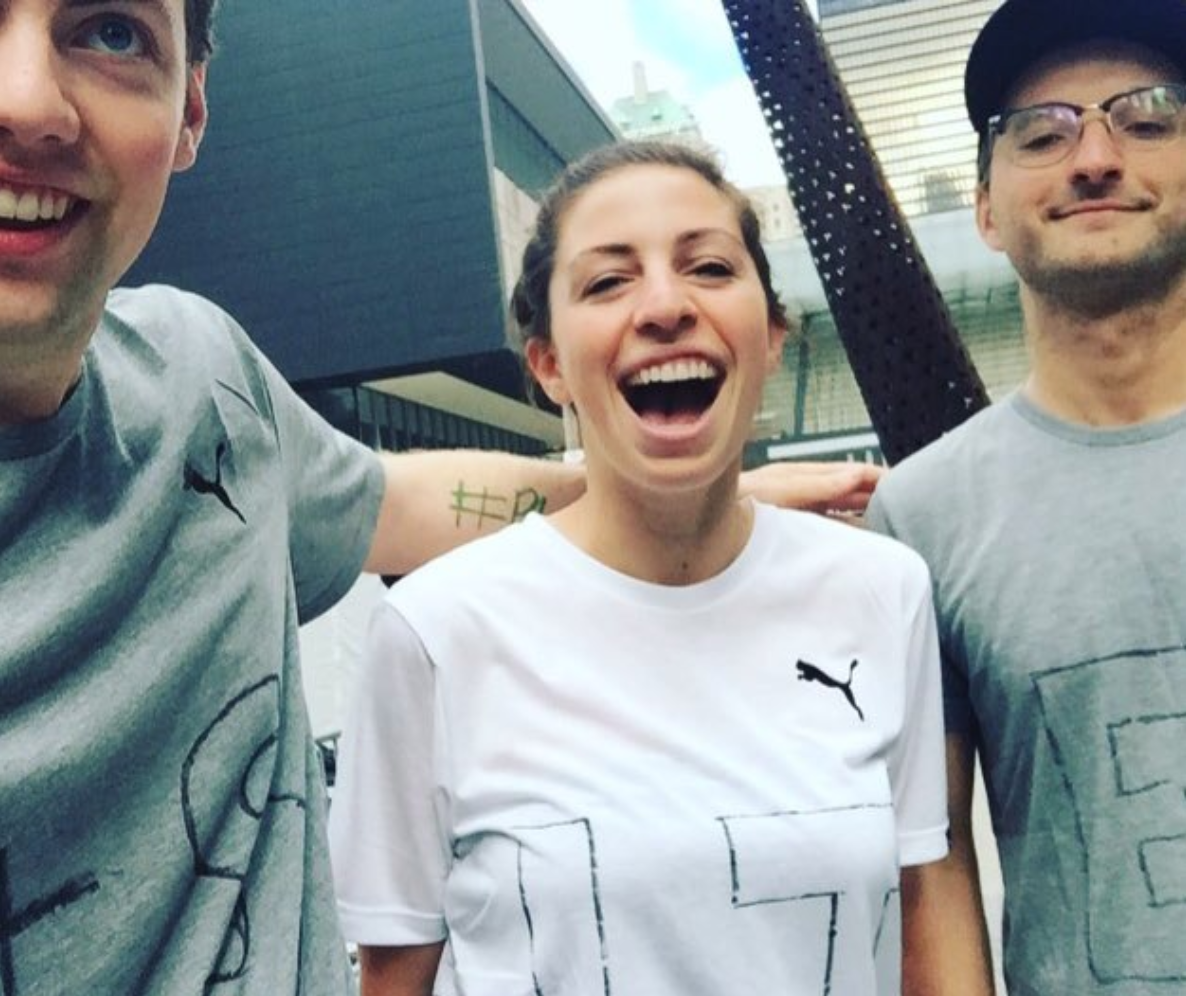Of course we’re not making money… but how do I have a job🤔? and more answers to things you’re worried to ask us

NO shame: Destroying brand new Puma Tshirts to get the attention of a Canadian sprinting star (Andre Degrasse!)
It won’t hurt our feelings to ask us the tough questions, because we have come a very long way since we launched OpenSports and we are proud of everything we have accomplished so far! Cliche or not, this is a journey and we have a lot of share. So let’s talk about the questions on your mind, shall we🙃?
Answers to five of the most common questions we get asked:
1. Why don’t more people know about your app?
In a crowded marketplace, fitting in is a failure. In a busy marketplace, not standing out is the same as being invisible. — Seth Godin
Life as an early stage startup is hard work. We don’t have thousands upon thousands of dollars for marketing, and we are limited by the time we can spend in various activities. There are frequently a lot of moving pieces for our indefatigable team of five, which makes prioritizing marketing activities and experiments difficult.
Here’s a run down of all of the departments you’d find in a successful tech startup: Design, Product Management, Data Science, Mobile Engineering (iOS/Android), Front-End Engineering, Back-End Engineering, DevOps, Operations, Human Resources, Sales, Business Development, Public Relations, Recruiting, Marketing, and Community. We are a team of five, running 15 departments.
We have always taken a community approach to marketing, because we believe that building real relationships with our players is the key to truly understanding their needs and continuing to develop a platform that is focused on the people who need, use, and love our app. We take a lot of pride in meeting athletes/users on the ground every week through pickup soccer and games that we set up through the app. Cultivating authentic relationships and getting to know people takes a long time, but doing that helps us get our messaging and product right, at which point, well…many more people will know about our app :)
2. Why are you just focusing on soccer? Isn’t that very limiting?
The more you know what you are, the easier it is to make choices and prioritize. — Jim, mentor
Have you heard the story of Mr. Mustard? One of our friends and advisors, Jim, painted a clear picture for us using this brilliant and fun analogy: Beat the big grocery store by being “Mr. Mustard”. In other words, if you’re going to be the mustard store (opensports) that sets up shop right next to the large grocery store (meetup), how will you attract business? The only way you can survive and thrive is to really, truly, deeply Know Your Mustard.
So what’s our Mr. Mustard: We know how to connect strangers for recreational purposes. We have looked at the competition, identified the sweet spot that we can exploit, and will eventually be the successful mustard store.
Since “recreation” is so vast, we need to know and understand a very specific segment of players in order to get it right and gain traction. Across sports, the needs of users are very different: a soccer organizer needs to get 8–12 people of various skill levels together for a game which can be played in a random park, whereas a tennis player needs to find one opponent of a very similar skill level, and that opponent might need a membership to the same facility. The common ground in these two cases is finding players that live in a similar location, are available at the same time, and play the same sport, and those are the connections we are focusing on making across all sports, by initially deeply understanding one.
It is only once we learn from the process of growing one sport, that we can then take those lessons and apply them to the next sports community that we are activating. The challenge lies when different sports communities want different features. Here’s a real example of where the balancing act gets tricky:
We had a really great meeting a few months ago with some impassioned leaders in the basketball community…and we felt so inspired and reenergized! It was a feeling of, WOW, lets dig right in and build a real-time GPS based followers function where you can see where and when your friends are playing (we know, great idea🔥!) But then, we started trying to prioritize projects, and realized we needed to continue to focus on enhancing our current feature set based on what our most loyal users need, and based on what’s been in the pipeline, instead of jumping in and building brand new ones. We will continue to develop those over time, but let’s keep things simple, listen to our users, and take smaller steps to get to the… well there is never a finish line, is there 🤔?
3. How is OpenSports doing? Are you making money yet? How do you get paid?
We would have been f🙊🐔ked if we were successful from the get go. — Me
Our revenue is probably in the ball park of an impressive $2.00 per week. Just kidding, but we’re not really making money yet!
Not making money as a startup is no new concept.
People are often vexed by companies like Snapchat and Pinterest, which have been valued at billions of dollars despite having zero in revenue. When Venture capitalist Marc Andreessen, who invests in no-revenue companies, addressed this topic, he basically says that many companies know how to make money, they just haven’t done it yet:
There are the ones where everybody thinks they don’t know how they’re going to make money but they actually know. There’s this kind of Kabuki dance that sometimes these companies put on where we’re just a bunch of kids and we’re just farting around and I don’t know how we’re going to make money. It’s an act. They do it because they can. They don’t let anyone else realize they have it figured out because that would just draw more competition. Facebook always knew, LinkedIn always knew, and Twitter always knew.
They knew the nature of the valuable product they were going to be able to offer and they knew people were going to pay for it. They hadn’t defined it down to the degree of being ready to ship it, or they didn’t have a sales force yet, so there were things that they hadn’t yet done. But they knew. They had a high level of confidence and over the passage of time we discovered they were correct.
Of course, we need enough funding… or “runway” to hit the next milestone. So, we participate in hackathons and apply for grants and such. In April we won a $25,000 Grand Prize from Interac for creating a live demo demonstrating how we would help them innovate the way businesses and individuals request and receive money. Our most recent win was a $10,000 finalist prize in MaRS & the Public Health Agency of Canada’s Healthy Behaviour Data Challenge (in which we are now competing to win a $25,000-$75,000 grand prize). And yes, that does mean that we all get paid to do our jobs 🙌!!!
4. What do you actually do on a daily basis?
Everything. Everything. “Accounting”, “HR”, Product management, sales, customer service, grant writing, community building, blogging, photo taking, idea generating, intern mentoring, data analysis, and being a silly goof.
As accurately depicted in the TV show silicon valley, we do have moments when we constantly chat, joke around, and waste time. We are sometimes that team that is loud and probably annoying… but one of the rules of thumb of having a successful startup is having a killer team and if camaraderie mixed with hard work is a reflection of a killer team, then ours is absolutely lethal. Hard work is necessary, long nights are necessary, but having fun is also very necessary.

We like to mess around, but know when to be serious (maybe)
We all have to do whatever the job requires… at any time of the day. Sometimes this means that at 11 pm when I’m about to cozy into bed, I end up helping James with a grant application for a few hours. It is truly a dynamic and ever changing job. Sometimes we have to do things we hate (be “Sales-y”… cringe)… but you do what you have to do to get the job done. I’m writing this very post at 1:02am after playing a soccer game because that’s when the inspiration came, and so that is when I will work!
5. Whats the point of this? Why are you doing this? Are you trying to build a business, be happy, cash out?
Start with the Why — Simon Sinek
This question put me to tears when I was first asked it within the context of another project I was building from the ground — a not-for-profit children’s soccer and life skills organization. At the time, I could not believe that people were questioning my intentions. But I quickly learned that in the business world, people truly want to understand “the why”. Not necessarily so that they can judge you, but so that they can provide the appropriate guidance.
The real answer is, it’s a mix. On one hand, I personally feel like this is one of the most remarkable experiences I will ever encounter. The learnings, the thrill, the fun, the professional growth… it’s all completely unquantifiable. So I absolutely recognize the value of OpenSports from that lens, and am certain the rest of my team does as well.
But I know, with certainty, that what really keeps us going is seeing the number of people who have become connected and made new friendships…
We make no mistake in saying that there are a lot of people who feel isolated… who don’t have their own communities of friends or of “sports friends”. A new guy from Ireland who could call on friends at a moment’s notice to get a kick-about going back home, but has lost that connection now… an undergrad student who left home in Kenya two weeks ago to move to Toronto to study and has yet to really meet anyone… a young woman who misses playing in a league as a teenager and is looking for some camaraderie…a recently unemployed man who finds himself with too much time on his hands and too little support from his friends.
Whether going through a life transition or not, many people are seeking a new experience. They come out to a game and feel it out, and they experience something that feels real, that feels connected. Seeing that in action, reminds me that we are exactly where we are supposed to be.
First time playing since moving to Toronto from Uganda. Stories like this are so real and so energizing, inspiring, and motivating.
If learning about how companies with amazing teams grow and thrive, I’d love for you to follow our journey and read our stories. Thank you so much for reading:)
Much Love, Alicia and the OpenSports team ❤
Questions? Send them our way: support@opensports.net